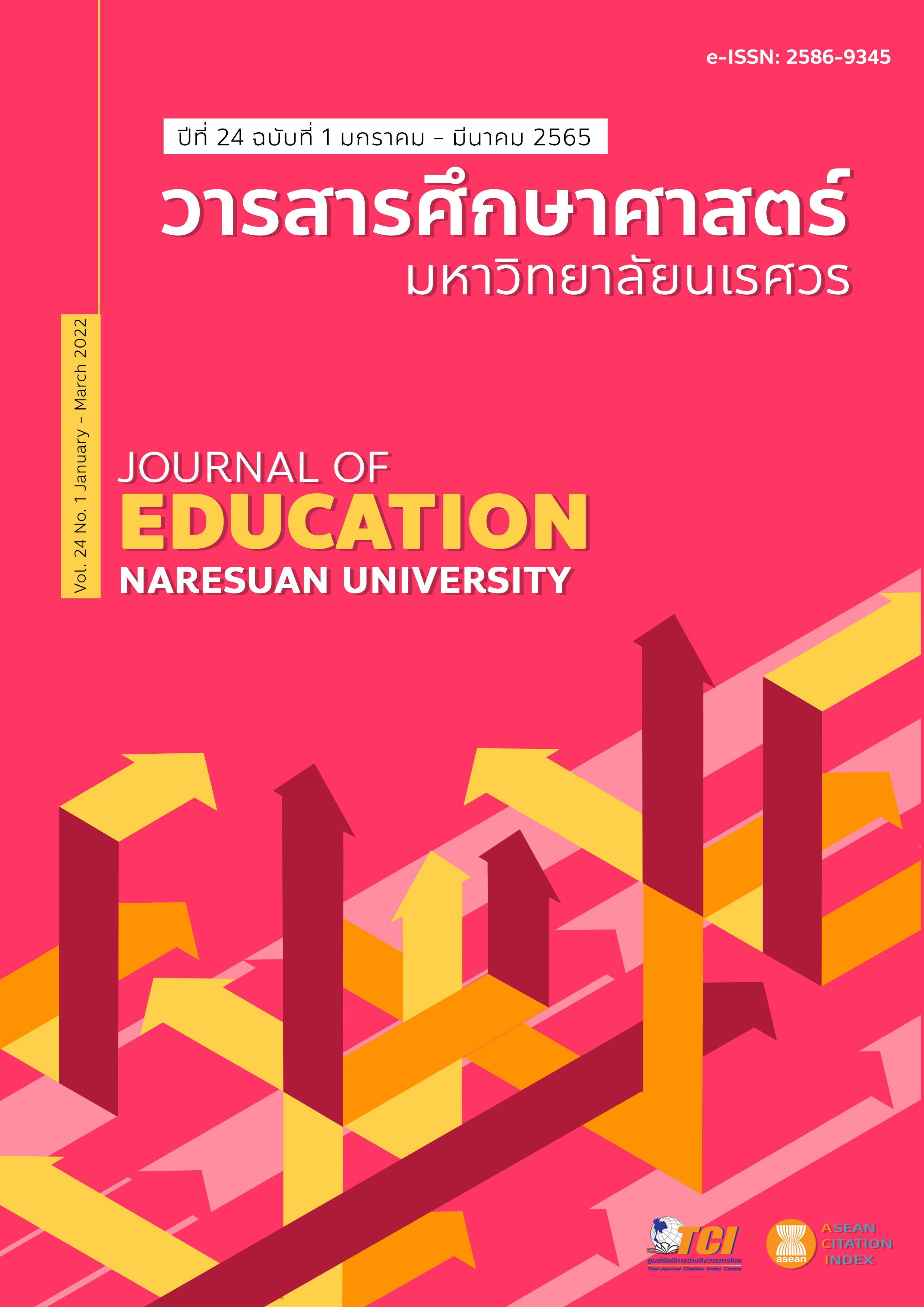THE EFFECTS OF 7E INQUIRY LEARNING METHODS WITH PROBLEM SOLVING TECHNIQUE ON TENTH GRADE STUDENTS’ PHYSICS CONCEPTS AND PHYSICS PROBLEM SOLVING ABILITIES ผลการจัดการเรียนรู้แบบสืบเสาะหาความรู้ 7 ขั้น (7E) ร่วมกับเทคนิคการแก้โจทย์ปัญหาที่มีต่อมโนทัศน์ฟิสิกส์ และความสามารถในการแก้โจทย์ปัญหาทางฟิสิกส์ ของนักเรียนชั้นมัธยมศึกษาปีที่ 4
Main Article Content
Abstract
The purposes of this research were to compare physics concepts and physics problem solving abilities of tenth grade students by using 7E inquiry learning methods with problem solving techniques before and after learning and after learning with the 70 percent criteria. The participants were 40 tenth grade students from Darasamutr School. They were selected through the cluster random sampling. The research instruments were lesson plans using 7E inquiry learning methods with problem solving techniques, physics concept test, and physics problem solving abilities test. The data were analyzed by using mean, standard deviation, dependent sample t-test, and one sample t-test. The results were summarized as follows: 1) The posttest scores of physics concepts of tenth grade students after learning with the 7E inquiry learning methods with problem solving techniques were statistically significant higher than the pretest scores and higher than the 70 percent criteria at the .05 level. 2). The posttest scores of physics problem solving abilities of tenth grade students after learning with the 7E inquiry learning methods with problem solving techniques were statistically significant higher than the pretest scores and higher than the 70 percent criteria at the .05 level.
Article Details

This work is licensed under a Creative Commons Attribution-NonCommercial-NoDerivatives 4.0 International License.
The owner of the article does not copy or violate any of its copyright. If any copyright infringement occurs or prosecution, in any case, the Editorial Board is not involved in all the rights to the owner of the article to be performed.
References
Anegasukha, S. (2016). Educational Research (8th ed.). Chonburi: Faculty of Education, Burapha University. [in Thai]
Chambers, S. K., & Andre. T. (1997). Gender, prior knowledge, interest, and experience in electricity and conceptual change text manipulations in learning about direct current. Journal of Research in Science Teaching, 34, 107-123. doi:10.1002/(SICI)1098-2736(199702)34:2<107::AID-TEA2>3.0.CO;2-X
Chimagam, N. (2015). The Development of Problem-Solving Ability in Physics Proposition by Incorporating Polya’s Technique into 7E Learning Cycle Model for Mathayomsuksa 6 Students. (Master of Education Thesis, Technology Thanyaburi University). [in Thai]
Chotchoei, P. (2015). The Conceptual Development of Electrostatic Using 7E Cycle Learning Approach of 11th Student. In National Academic Conference Phetchabun Rajabhat University No. 2 "Research for Local Development" (pp. 384-390). Phetchabun: Researchand Development Institute Phetchabun Rajabhat University. [in Thai]
Ding, N., & Harskamp, E. (2006). How Partner Gender Influences Female Students’ Problem Solving in Physics Education. Journal of Science Education and Technology, 15(5), 331-343. DOI:10.1007/s10956-006-9021-7
Duangkaew, E., Pibranchon, S., & Sirisawat, C. (2016). A study of physics learning achievement and ability to solve physics problems of students in mathayomsuksa 5 by using the inquiry method and heller and heller logical problem solving strategy. Journal of Education Naresuan University, 18(1), 181-193. [in Thai]
Heller, K., & Heller, P. (2010). Cooperative problem solving in physics a user’s manual. Retrieved from https://www.aapt.org/Conferences/newfaculty/upload/Coop-Problem-Solving-Book.pdf
Hestenes, D. (1987). Toward a modeling theory of physics instruction. American Journal of Physics, 55, 440. https://doi.org/10.1119/1.15129
Ministry of Education. (1999). National Education Act, 1999, amended (No. 2), 2002. Bangkok: Kurusapa Ladprao Printing. [in Thai]
National Institute of Educational Testing Service (Public Organization). (2017). The results of the examination 9 ordinary subjects. Accessible from http://www.niets.or.th [in Thai]
Nuangchalerm, P. (2007). 7E Science inquiry learning method. Academic Journal, 10(4), 25-30. [in Thai]
Nuangchalerm, P. (2015). Learning science in the 21st century. Bangkok: Chulalongkorn University Press. [in Thai]
Padungsakchaikul, B. Teachers Darasamutr School (2018, February 14). Interview. [in Thai]
Polya, G. (1957). How to solve it. A new aspect of mathematical method (2nd ed). Princeton: Princeton University Press.
Ponyiam, T. (2017). The Study of Physics Problem Solving Ability and Physics Achievement on Momentum and Collisions of Tenth Grade Students by Using The Inquiry Method Incorporated with Polya’s Problem Solving Technique. (Master of Education Thesis, Burapha University). [in Thai]
Redish, E. F. (1994). Implication of Cognitive Studies for Teaching Physics. American Journal of Physics, 62(9), 796-803. https://doi.org/10.1119/1.17461
Rojas, S. (2010). On the Teaching and Learning of Physics Problem Solving. Revista Mexicana de Física, 56(1), 22-28.
Rujinirun, C. (2009). Thai science education system will reach the stars or going to stage cancer at the end of episode 3 (ending) path to university. Thai Journal of Physics, 26(4), 22-26. [in Thai]
Sonsrida, C. (2017). The effects of 7e learning cycle with Polya’s problem solving techniques on scientific concepts, problem solving abilities, and attitude towards physics of eleventh grade students (Master thesis). Chonburi: Burapha University. [in Thai]
Sripudyos, P., Srisanyong, S., & Singlop, S. (2016). A study effect of inquiry learning cycle (7Es) and cooperative learning with jigsaw 2 technique on plant responses to develop biological learning achievement, scientific concept and scientific mind for 11th grade students. Journal of Education Naresuan University, 18(2), 181-193. [in Thai]
Subcommittee on the Development of Teaching and Production of Science Teaching Materials. (1982). Teaching kit for science teachers, Volume 1. Bangkok: Ministry of University Affairs. [in Thai]
Thipkong, S. (2001). Solving math problems. Bangkok: Kurusapa Ladprao Printing. [in Thai]


